Guitar round table: Between The Buried And Me / Plini / Tesseract
6 progressive titans talk tone, technique and the evolution of prog-metal

Want all the hottest music and gear news, reviews, deals, features and more, direct to your inbox? Sign up here.
You are now subscribed
Your newsletter sign-up was successful
What happens when half a dozen visionaries of contemporary prog gather to talk electric guitar in an enclosed space?
We can’t remember the last time we attempted to corral six guitarists at one time, but this is Round Table and we’re hosting a very special gathering of keen progmen par excellence; three very different acts, all living up to the standard that progressive guitar playing is about - carving unique and constantly evolving musical paths. All with the knowledge of experience to share with you.
Australian instrumental maverick fusioneer Plini has brought live guitarist and old friend Jake Howsam - also member of Point Below Zero and The Helix Nebula. Brits Tesseract continue to go from strength to strength with seven-stringers Acle Kahney and James Monteith, transcending their early metal tag and exploring a unique kind of progressive rock.
And lastly, but certainly not least, we have Paul Waggoner and Dustie Waring of Americans Between The Buried And Me; remarkable players who are nine albums deep, rising up from their metal roots and into a rich and varied goldmine.
At this stage I just want to be able to play what I hear in my head, as fast as possible
Paul Waggoner
You’re all a mix of being self-taught and having had formal lessons when you were starting out, are there advantages to being self-taught when it comes to finding your own way?
Plini: “I think it might have been bad if I’d had a bad teacher who had told me I’d never be anything and that C is the only scale. But I think if you have a good teacher it’s probably inspiring.”
Acle Kahney, Tesseract: “Yes, inspiring more than stifling.”
Want all the hottest music and gear news, reviews, deals, features and more, direct to your inbox? Sign up here.
Paul Waggoner, BTBAM: “I think it depends on what trajectory you’re looking for as a musician. If you want to be a classical guitar player, obviously, you’re going to want to learn how to sight read. But in the world that we’re in, it’s probably good to have a healthy balance. For me, learning music theory was more of a communication tool, a way to communicate to other band members. But I could see how it could maybe stifle creativity a little bit; if you adhere to that kind of thing too much it becomes very regimented and can maybe build a wall around your creativity.”
Dustie Waring, BTBAM: “Overthinking.”
Paul: “Yes, all of a sudden music becomes mathematical and you maybe don’t trust your gut enough. Having learned theory when I was younger, I don’t even think about the vast majority of it anymore. At this stage I just want to be able to play what I hear in my head, as fast as possible… and as bad as possible!”
Jake Howsam: “Me and Pilni are at the same point theoretically, but have got there in vastly different ways. So a lot of the time we think in terms of intervals or whatever, but I may have got there through learning modes and Plini has got there through the sheer experimentation of, ‘What does this note sound like over this chord?’ But it all comes down to being able to hear and play what is in your head as quickly as possible.”
James Monteith, Tesseract: “Music theory is a bit like a brain exercise as well when you’re learning. It’s like learning maths and then going on to be an engineer or a scientist. It’s like a tool but it’s definitely not a vital part of the creative process.”
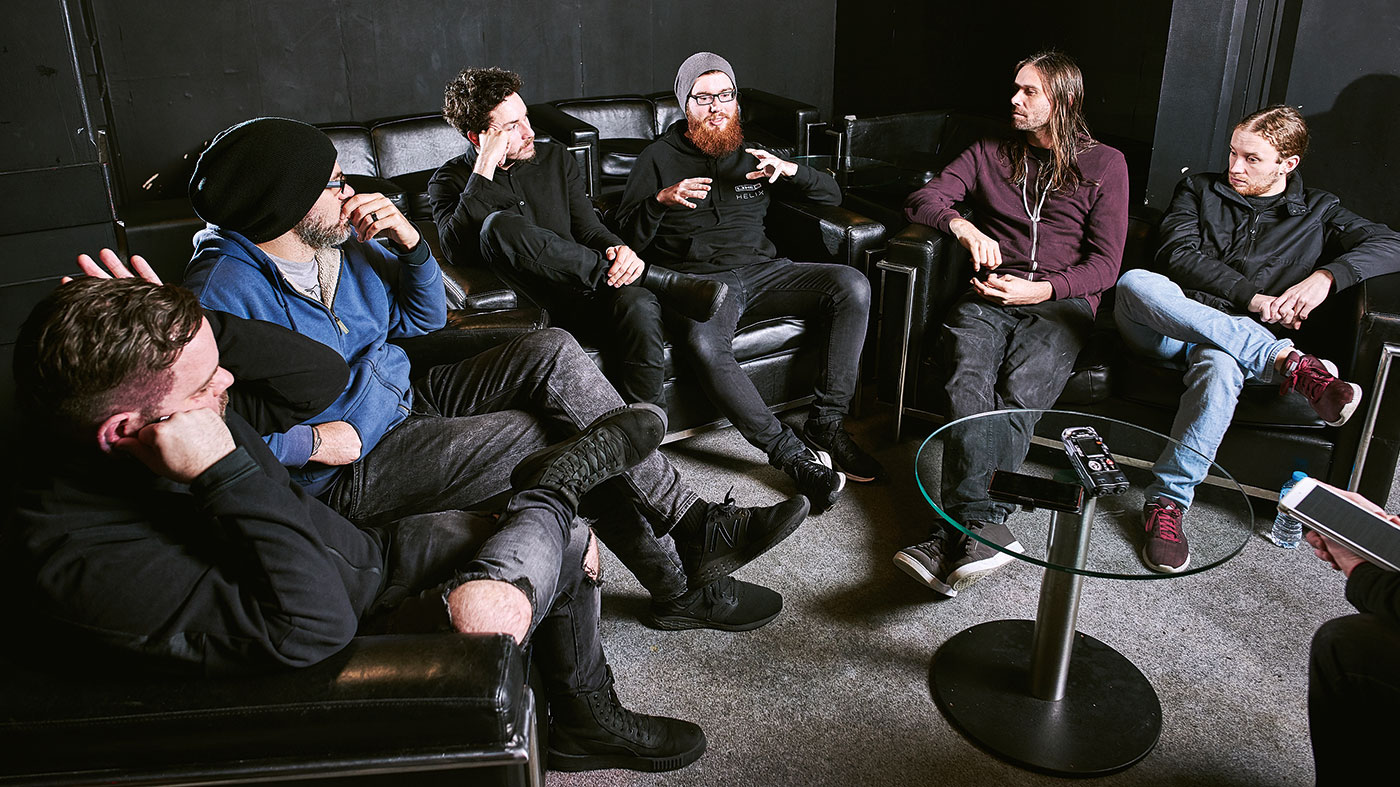
Learning overload
There’s a huge amount of resources available now to learn from - but do you think it can almost be an overload of information?
Paul: “James and I are probably the oldest here and when I was learning guitar you’d have to buy a crappy VHS tape or buy a book. YouTube didn’t exist and I see young players, like Plini even though he’s not super-young, when I see them play I’m like, ‘How the hell did you learn to play that good that fast?!’ Now I realise he kind of cheated - he had a lot more resources!
“It’s hard for me to even relate to the younger modern guitarists. When I was growing up it wasn’t cool to play well. I grew up in 90s grunge / alternative. If you played a solo you were a nerd. It was almost about the worse you played the better. It took me a long time to be at a point where I was like, ‘Maybe I should learn to play guitar properly.’”
You learn a lick and then build your own encyclopaedia of parts off that one lick. Make it your own
Dustie Waring
James: “I also remember discovering lots of tab books were very lazily done as well, completely incorrect, and you’d end up learning things the wrong way. Through listening to the songs yourself you’d find out how to play things the right way.”
Dustie: “Most of my learning was sitting down and learning the songs of the metal bands I really liked [by ear]. I was probably playing it all wrong but I was trying to figure it out. That was a teacher for me.”
Plini: “Even though there’s so much stuff out there it’s like what Paul was saying, you’ve still got to figure out what you want to become. I had a friend who went to Berklee and studied with a guitarist I really like. And I mentioned that to him and he sent me a gigabyte of four years of course material. And I just skimmed through it and learned like one lick. Because I’m not going to learn four years of Berklee guitar playing, but that one lick has occurred throughout a bunch of new songs. So it’s just like random bits and pieces that are useful.”
Dustie: “I think that’s what happens; you learn a lick and then build your own encyclopaedia of parts off that one lick. Make it your own.”
Jake: “I teach guitar and I have a lot of students who ask, ‘Where do you begin writing music?’ and if you have no vision in mind as to what you want to do as a musician it’s almost impossible. Because you can literally do anything and when you’ve got no boundaries as to what you can do - where do you start? For playing you have to know to some extent what you want to do and what your goals are to make things work.”
Do you also agree that you can’t start guitar thinking about a career? You’ve got to set out focussed on the music first and just enjoy that…
Acle: “Unless you want to be a session player.”
Dustie: “It’s important for people who start playing guitar to just learn how to sit down and jam on the instrument. That’s how you come up with riffs and parts. Sit down, plug into your amp and enjoy playing guitar. Not thinking too much about, ‘I want to be rich and be a rockstar.’ Play some riffs and enjoy it.”
James: “I think that’s the key word - enjoy. Because if you don’t really love it, you’re not going to put the time in.”
Dustie: “Young kids nowadays, you’re screwed anyway if you’re trying to be some rich, famous rockstar.”
Paul: “The reality is with all of us, with the situations we’re in, luck is the key component. We’re all really fortunate that people liked our stuff . We were making music and somehow it made its way to a level where we were able to tour and play shows. For most people it’s just not gonna happen - that’s the reality of it.
“So you absolutely can’t start with the objective of making a career in music. It’s pointless. You definitely have to have a passion for playing music and enjoy writing for the sake of creating something. It has to be totally for the love of the game, so to speak. The other stuff is by happenstance, even if you’re lucky enough.”
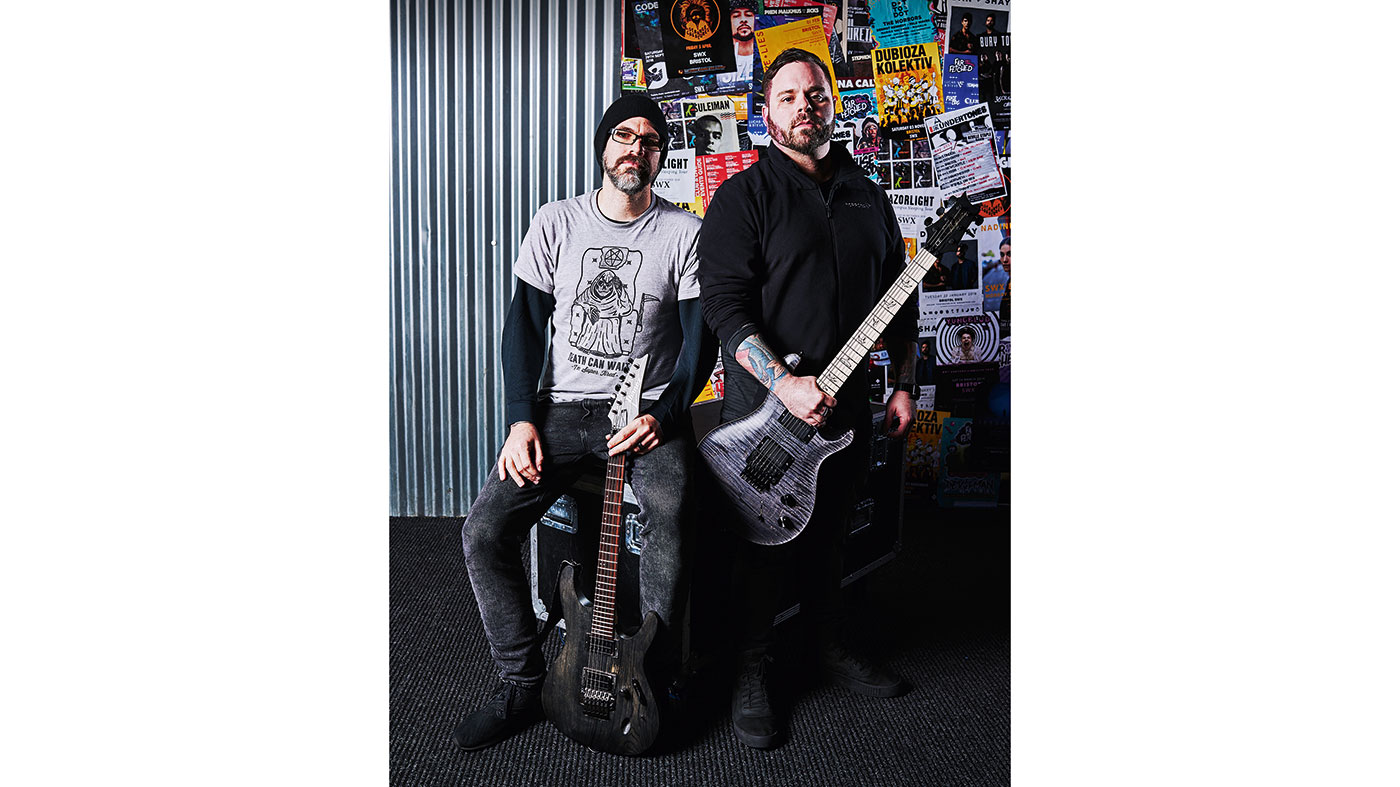
Tonal recall
How have your approaches to tone changed over the years? Did you all start with the idea that more gain = better?
Dustie: “My first amp was a 5150 and I put the presence all the way on 10, gain all the way on 10 and mids off. It’s funny, very early on in my career with Between The Buried And Me, me and Paul had identical rigs and we used no mids.
“James Murphy [Obituary, Death and Testament] came to one of our shows and he’s standing backstage and he said, ‘Yeah I’ve got your new record, I like the stuff but can I give you a little pointer? Your live tone is fucking shitty, man. I can’t tell what you’re playing. You’ve got to turn the mids up.’ And from then on we realised mids are nice!”
I thought scooped-out gain sounded cool but it turns out that it’s not a very musical tone, you need some mids in there to clarify the sound
Paul Waggoner
Paul: “When I first got into metal I was listening to death-metal - Suffocation, Cannibal Corpse… stuff with like a scooped-out sound. Gain was dimed out. I thought it sounded cool but it turns out that it’s not a very musical tone, you need some mids in there to clarify the sound a little bit. Oh man, the journey of tone is quite a discussion…”
Dustie: “I’d say every record of ours has had less gain than the one before it.”
Acle: “It’s the same with us as well - we have more of a crunchy tone.”
Dustie: “I noticed that at the beginning of the tour with you guys, and I guess you can’t use too much gain with being so percussive. And with seven-strings if you had too much gain you wouldn’t be able to hear all those parts.”
James: “However, on the new record [Sonder] with the long sustained open notes there’s super gain on those to make them sound filthy.”
Paul: [turning to Plini and Jake] “I think you guys use too much gain, it sounds really bad.” [everyone laughs]
Jake: “We’re going off your early records!”
Plini: “I’d say I’ve used less and less gain. The last EP I did [2018’s Sunhead], all the gain was in the bass. The guitars just sound like Strats and the bass is disgusting.”
Paul: “It’s cool though because there are different ways to achieve heaviness, it’s not always with gain. When I was younger that’s how I thought you made it sound brutal - with gain. The more the better.”
Acle: “It works for Meshuggah somehow. They have achieved a really scooped sound.”
Dustie: “What is weird though, the more gain you have the smaller… your wave is…”
Plini: “I didn’t think that’s where that was going.” [everyone laughs]
Dustie: “When recording, the more gain you have the smaller it is. When you back your gain off, you take two guitar tracks that on their own you think, ‘This sounds thin.’ You put them together and it’s massive sounding. That’s a thing you learn with experience.”
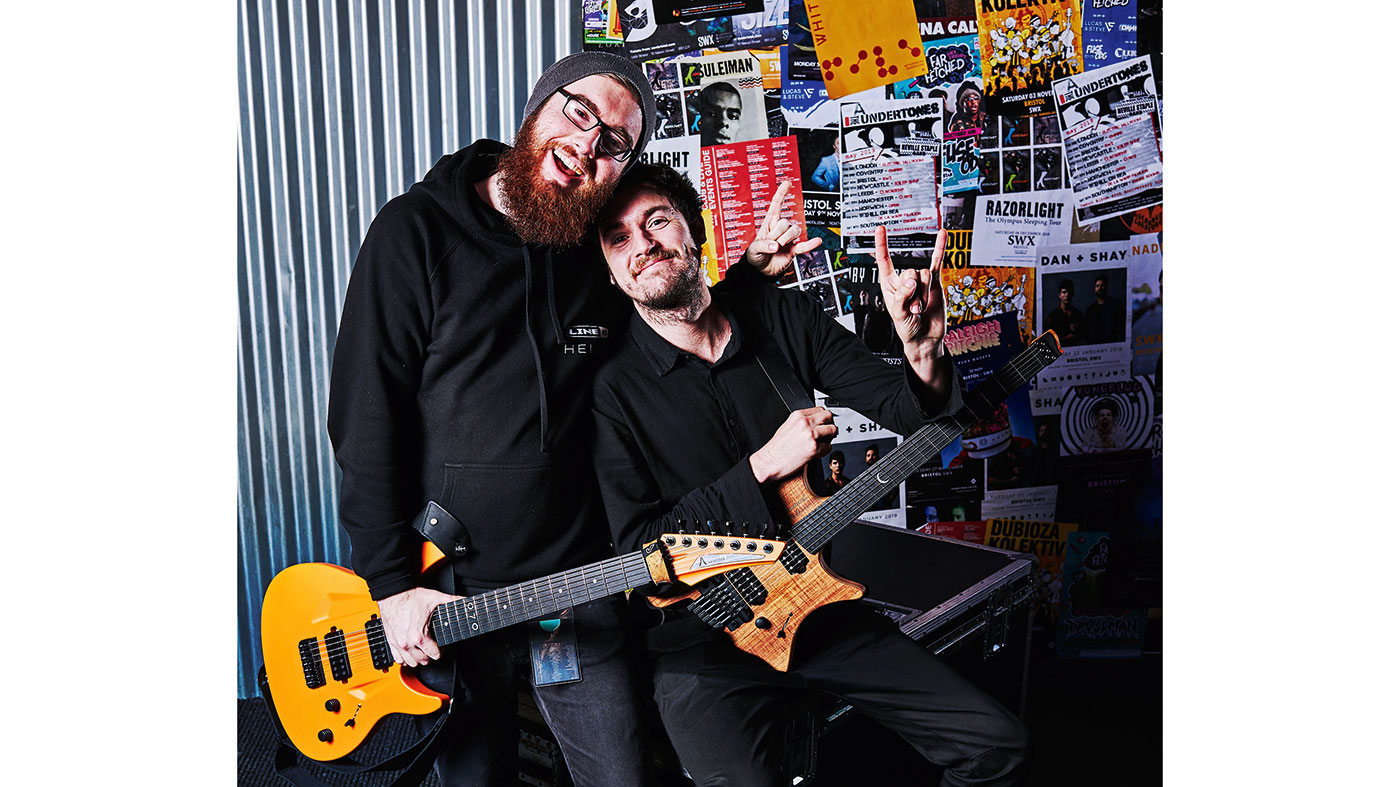
Axe-effected
Tesseract were quite early adopters of the Fractal Axe-Fx; what about the rest of you guys?
Paul: “They use it like it’s supposed to be used. We use it for preamp and effects, we use it through amps and cabs.”
Plini: “I had a combo amp and it sucked and from then on it’s been digital.”
Paul: “That’s crazy.”
Jake: “We’re currently using one Axe-Fx III for both of us.”
What’s amazing about it is there are so few variables now. Because everything is in this box and our in-ear system is part of that
James Monteith, Tesseract
Paul: “Are you telling me you’ve never owned a Crate full stack?”
Plini: “Sounds like something you’d keep milk in…”
Paul: “That’s probably a better use for it. It was the GX-130C. The C stood for chorus. It was awful.”
Dustie: “Dying Foetus distortion.”
Paul: “With mids off. I wish I’d grown up in today’s age of good amps.”
Plini: “But people can still find a way to sound shit.”
There is a romantic notion associated with the concept of the ‘stack’ but it seems like it’s at odds with the realities of freight costs and the fly-in gigs that your bands have. Now you can realistically take your recorded studio sound with you.
James: “What’s amazing about it is there are so few variables now. Because everything is in this box and our in-ear system is part of that, so our mix every day is exactly the same, apart from some mild variations with the drums because of the room. And so it just makes everything really convenient and reliable.”
Acle: “There’s lots of automation you can do, too - delay trails and reverb.”
Have you got more ambitious with it on that side?
Acle: “Yes, probably, but I haven’t used a real amp in about 10 years so I don’t know what it’s like to use a real one anymore. But at the start I definitely felt I could do more when I made the transition.”
James: “What’s nice with it as well is you can take some of the work away from front of house. If one of us goes to a lead part, they go centre and basically front of house can just focus on the sound and not worry about the panning.”
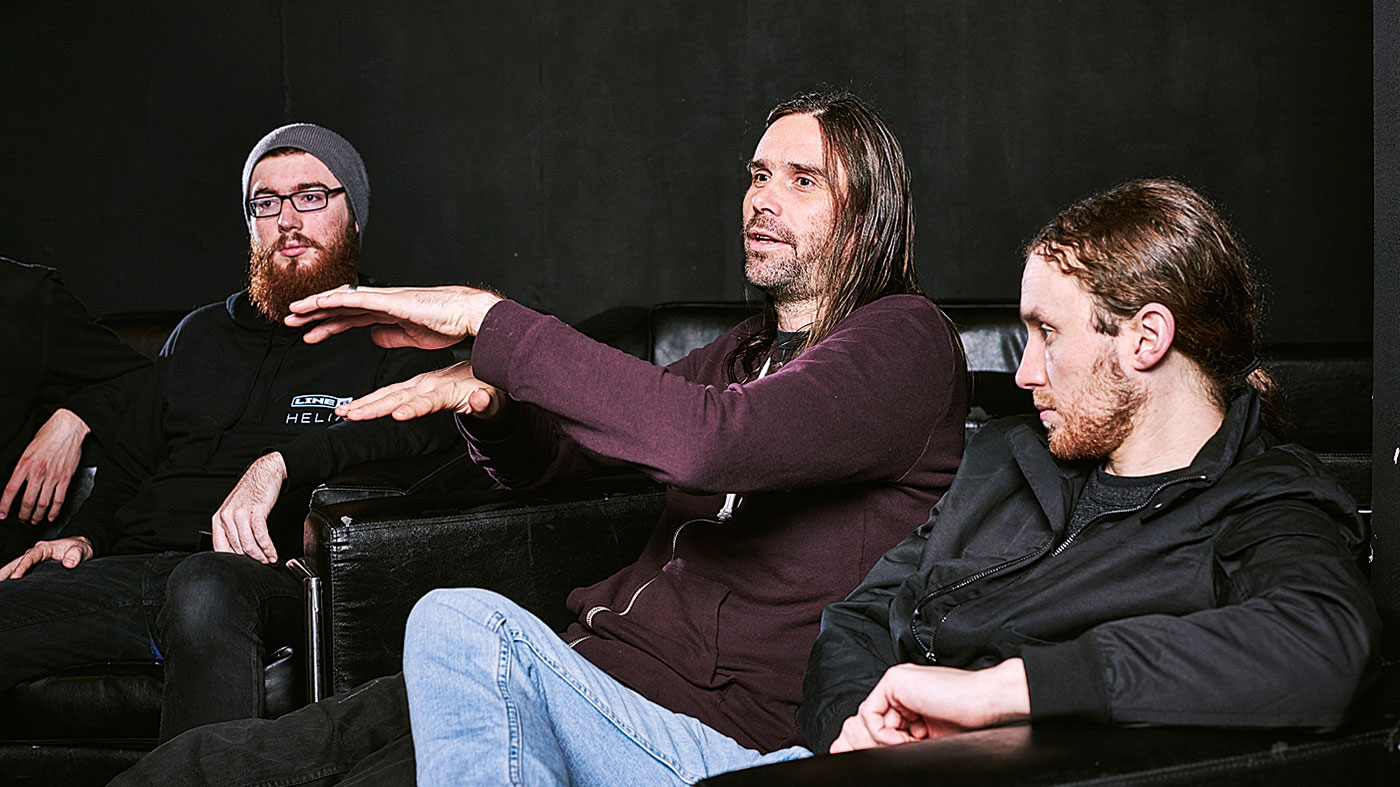
Too much tone
Do you think the huge possibilities with tone can be a bit of a distraction for guitarists? Has the upside of accessibility to sounds actually created a problem for some?
Dustie: “I see a lot of younger players and they get an Axe-Fx with a boutique guitar and they’re learning how to sweep before they can even play over a 12-bar blues. So, yeah, to some extent I think there is almost too much shit going on at some point. But I also think that with time they will figure it all out.”
In reality if you work hard enough, you should be able to get a decent result out of just about any gear that you can buy on the market today
Jake Howsam
Paul: “You can now buy a lifetime’s worth of gear in one time. With Axe-Fx you’ve got however many amps, effects. I could see how that could be overwhelming for a young musician who hasn’t really learned to play yet.”
Jake: “I also see a lot of young people not creating because they don’t have the gear. Like, ‘I can’t afford the Axe III and so I will wait until I can afford the Axe III to actually write any music or try and improve because it’s not going to be good enough without that.’ When in reality if you work hard enough, you should be able to get a decent result out of just about any gear that you can buy on the market today. It’s in the hands.”
Dustie: “The hands are the most important thing. Any of us could play through Eddie Van Halen’s live rig and it wouldn’t sound anything like him. Or Dimebag’s. Your hands are what really matters because that’s where your character is.”
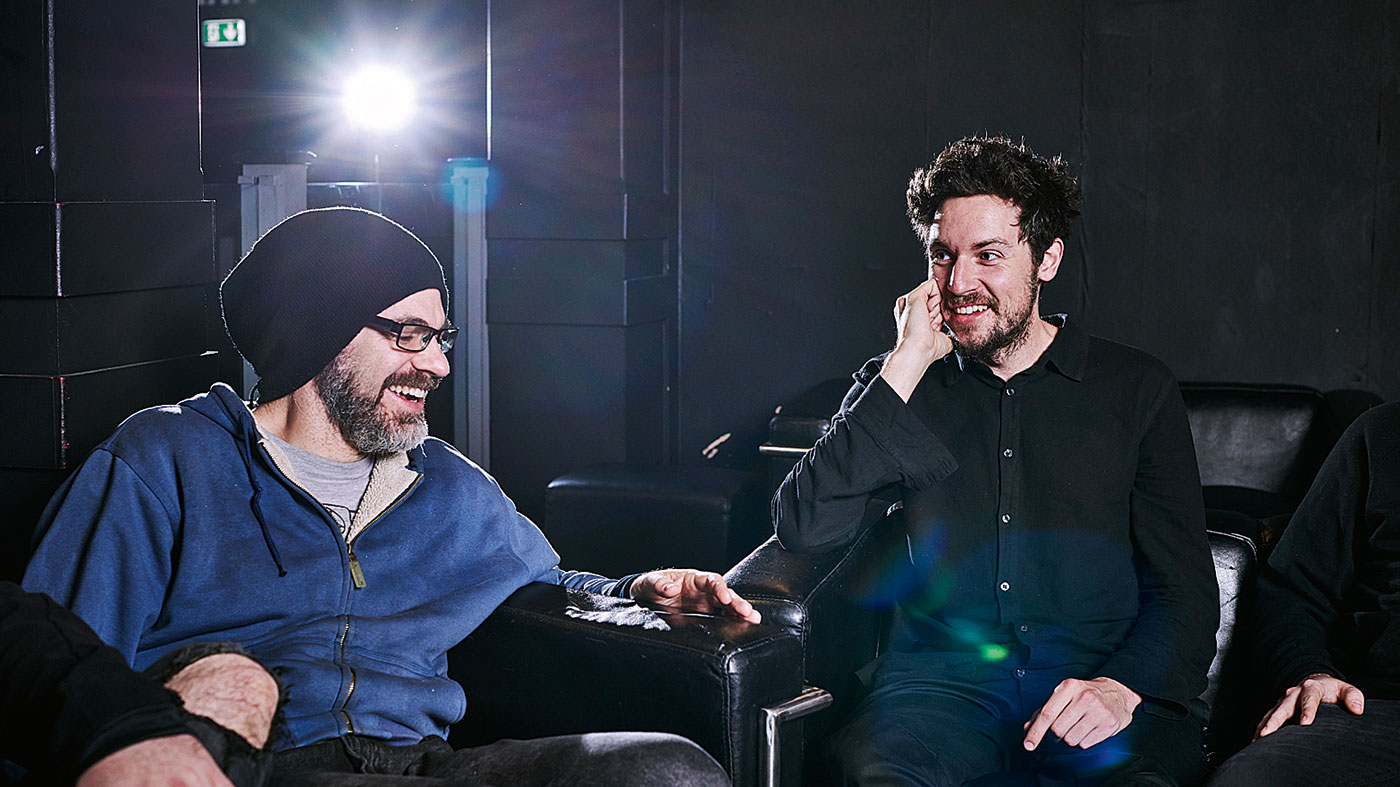
The word progressive gets thrown around a lot now, and sometimes it feels like it’s being used to describe a style of music rather than a mindset. What does it mean to you?
Plini: “There’s a whole style of progressive metal where everyone sounds like Dream Theater. And that’s one definition. But to me progressive is any band that doesn’t sound like another band. So with these guys here it would be really hard to describe what they sound like without saying, ‘Go to the show or get the album.’”
Dustie: “I think people do look at it as a style of music too. Like, ‘What are you into?’ ‘Oh I like prog.’ I think it’s definitely turned into that, more so than just being in the mindset of having no rules.”
James: “If you talk to someone who was around in the '70s and tell them you love prog, they’ll think of Yes, Genesis and all those bands. They’ll think of that as a style as well, even though at the time it wasn’t. I think that’s always going to stick, people are always going to label sounds with ‘prog’.”
Dustie: “It’s almost impossible to meet a friend or a great uncle and they’ll be like, ‘You still in that band? What ya’ll sound like? Metallica?’ And I’ll say, ‘No we’re kind of like progressive metal.’ And they say, ‘Like Disturbed?’ ‘Yeah, like that!’” [laughs]
Paul: “Musicians are never comfortable categorising their own bands. Where do you fit in? I don’t know! We just write music and it just comes out sounding like it sounds, but we have no desire to fit in… if you want to call it prog that’s fine. We’ve heard people call it mathcore, all these other names and it means nothing to me. It’s like when people call Tesseract a djent band. Okay… I guess? I listen to them and they sound like a really good rock band - it’s melodic, it’s heavy, it’s rhythmic. I’m sorry but I don’t know what djent means, just as I don’t know what prog means anymore.
There’s nothing metal about Plini. Aside from your beard, Jake. It just sounds good. It’s unique and it sounds awesome
Paul Waggoner
“And when I listen to Plini I hear a really good jazz fusion, that’s how I hear it. But you guys get lumped into the prog-metal. There’s nothing metal about Plini. Aside from your beard, Jake. It just sounds good. It’s unique and it sounds awesome.”
Plini: “This is my new publicist!”
Paul: “And for me that’s good enough but this music has to be marketed somehow to the masses, and that’s where you get these labels. But it’s really just a sales tactic.”
Dustie: “I find the labels are mainly used with younger people. Sometimes I’ll overhear kids, ‘Yeah they’re like deathcore but the other band they’re with are like screamo punk metal.’”
Paul: “Then there will be some other sub-genre; it keeps getting chopped up. It’s kind of goofy at this point. It’s like, who cares what it’s called?”
James: “One of my favourites was crabcore. It was about the guitar player’s stance, not the music.”
Dustie: “That was the most infuriating thing I’ve ever seen in my life!”
Paul: “That’s funny though. We’re at a point where we describe music, which is a sound, based on the way someone looks.”
Dustie: “How do you tell your grandma that you’re in a crabcore band!?” [Everybody laughs]

Rob is the Reviews Editor for GuitarWorld.com and MusicRadar guitars, so spends most of his waking hours (and beyond) thinking about and trying the latest gear while making sure our reviews team is giving you thorough and honest tests of it. He's worked for guitar mags and sites as a writer and editor for nearly 20 years but still winces at the thought of restringing anything with a Floyd Rose.

